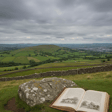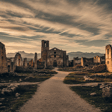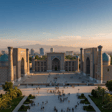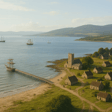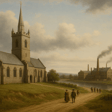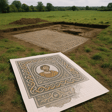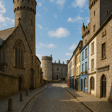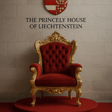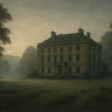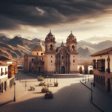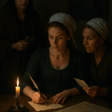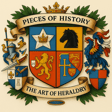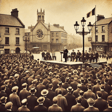The Caribou Gold Rush: A Catalyst for Change
00:00:14
Speaker
It began with a whisper, of gold in the wind, ungoverned interior of British North America. By the time the first flakes hit the bottom of a prospector's pan, thousands were on the move, through treacherous canyons, across snowbound passes, deep into the Caribou Mountains, all chasing a dream that glittered just out of reach.
00:00:34
Speaker
Hello and welcome to Pieces of History, I'm Colin McGrath. In each episode I delve into some renowned and lesser known events throughout history. Today we're heading into the wild heart of British Columbia to explore one of the most dramatic and transformative chapters in Canada's past, the Caribou Gold Rush.
Pre-Confederation Canada: Geography and Cultural Duality
00:00:53
Speaker
backdrop of towering pines, winding rivers and rugged terrain, this was a time of promise, peril and relentless ambition. What started as a trickle of prospectors would become a full-blown stampede, forever reshaping the region and its people.
00:01:08
Speaker
But this isn't just a story of gold, it's a story of migration, multiculturalism and myth. We'll uncover the lives of the lesser known figures who staked our claims, built communities and, in some cases, vanished without a trace.
00:01:23
Speaker
Before we dive into the gold fields of the 1860s, let us take a moment to reflect on the country with its Russian folded, Canada. A land known for its vast
Colonial Past and Indigenous Influence
00:01:33
Speaker
wilderness and plight reputation, but there's far more beneath the surface.
00:01:37
Speaker
Canada is a country of duality, English and French, prairie and tundra, indigenous heritage and immigrant dreams. It is the second largest country in the world by land area,
00:01:48
Speaker
stretching from the Atlantic to the Pacific and up into the Arctic Circle. Over 40 million people call it home, most of them clustered along the southern border where cities like Toronto, Montreal and Vancouver pulse with commerce, culture and the hum of a diverse, multilingual population.
00:02:05
Speaker
This vast land is divided into 10 provinces and 3 territories, each with its own identity, landscape and rhythms. From the windswept plains of Sasquan to the rugged coastlines
Fraser River Gold Discovery and Colonial Tensions
00:02:17
Speaker
and from the boreal forests of Ontario to the icy reaches of Nevilleville. The Canadian economy is among the most advanced in the world, built on a blend of natural resources, technology, finance and trade, much of it shaped by its proximity to and partnership with the United States.
00:02:34
Speaker
Canada's system of government is a constitutional monarchy but the parliamentary democracy. The British monarch remains the ceremonial head of state, represented in Canada by a Governor-General while the real power lies with its elected officials, a Prime Minister and members of Parliament who govern from the capital city, Ottawa.
00:02:53
Speaker
This structure reflects the country's colonial past, as Canada was first founded as a dominion of the British Empire in 1867 through confederation, uniting Ontario, Quebec, New Brunswick and Nova Scotia.
00:03:06
Speaker
Over time, other provinces and territories joined, shaping the Canada we know today. But the story of this land does not begin in 1867, not by a long shot. Long before European ships arrived on its coast, Canada was home to a vibrant and diverse indigenous nations.
00:03:24
Speaker
From the hiatus of the Pacific Northwest, to the Cree of the Central Plains, the Imcoq of the East Coast to the Inuit of the Arctic, these communities built complex societies rooted in deep respect for the land, storytelling and kinship.
00:03:38
Speaker
Their histories are not relics of the past, they are living, evolving and deeply interwoven into the fabric of the nation, even as Canada continues to reckon with the legacy of colonialisation, displacement and residential schools.
00:03:52
Speaker
It was during the mid-19th century, in the midst of colonial expansion, economic uncertainty and geopolitical tension, that British Columbia saw a flood of dreamers, drifters and desperadoes descend upon its interior in search of gold.
00:04:06
Speaker
Now, let's venture back in time to dusty trails, rowdy boom towns and gold pans glittering in the icy rivers of the Caribou. This is the story of a rush that changed the region and helped shape a nation.
Isolation and Gold in Caribou Region
00:04:19
Speaker
where is our story set? In early 1860s, the Caribou region of what is now central British Columbia was a place of breathtaking isolation. a rugged expanse of dense forest, icy rivers and soaring mountain ranges.
00:04:33
Speaker
Few outsiders had ever laid eyes on it. It sat far removed from the political centres of the British Empire and even further from the cities of eastern Canada. At that time, Canada as we know today had not yet taken shape.
00:04:47
Speaker
Confederation was still several years off, 1867 would mark its birth and British Columbia wouldn't join the Dominion until 1871. Instead, it remained a separate colony on the western edge of North America, its future uncertain, its connections to the rest of the continent tenuous at best.
00:05:05
Speaker
European knowledge of the interior was limited. Most of the region
The Rise of Barkerville: Billy Barker's Legacy
00:05:09
Speaker
was unmapped, at least by western standards. The Fraser River served as the principal entryway, a mighty winding corridor stretching from the snowbound mountains to the Pacific coast.
00:05:20
Speaker
But this river and the land it flowed through was far from unclaimed. For millennia the Swapmik, Dalia and Tilsquaton nations had lived, traded and governed this land.
00:05:31
Speaker
Their presence was not fleeting or scattered, and was foundational. These communities had their own intricate systems of governance, economy and environmental stewardship. They knew the contours of the land by heart, not by ink on paper, but by memory, story and spirit.
00:05:48
Speaker
We have lived here since time immemorial. The land feeds us, the rivers carry our stories and the mountains watch over our people. That's a quote from a Tilsquanthan elder later recorded in ennographic accounts from the early 20th century.
00:06:02
Speaker
But in 1856, a discovery changed to everything. That year, gold was found along the banks of the Fraser River and with it came a tidal wave of change. What became known as the Fraser Canyon Gold Rush pulled over
Infrastructure and Law in the Gold Rush Era
00:06:15
Speaker
30,000 prospectors into British territory within months.
00:06:19
Speaker
Many came from California, still buzzing from its own gold rush a decade earlier. Here's a quote from Henry Spencer Palmer, a royal engineer, in a letter to his family in 1856. Never have I seen such a spectacle.
00:06:33
Speaker
Men from every nation crowded the banks of the river, elbow to elbow, their eyes fixed on the gravel below. The sudden American presence sparked alarm in colonial circles. With so many US citizens pouring into the territory, British officials feared that Washington might use the chaos as a pretext to claim the region outright.
00:06:52
Speaker
an extension of the expansionist ideology known as Manifest Destiny. And here's a quote from Governor James Douglas in a dispatch to London in 1856. We must act swiftly and assertively to maintain British sovereignty in the face of this American tide.
00:07:08
Speaker
To counter the threat and assert control, the colonial government moved quickly. New infrastructure projects were launched to solidify British presence in the interior. Chief among them was the ambitious Caribou Wagon Road, designed to carve a path from the coast deep into the goldfields.
00:07:25
Speaker
And here's another quote from the Royal Engineers. The country is wild beyond imagining. The road hangs on a cliff face like a ribbon on a rock. One misstep and it's a fall to the river below.
00:07:37
Speaker
Before the road, there had only been narrow trails and indigenous food paths winding through the wilderness. Reaching the interior required stamina, courage and no small measure of luck. Steep inclines, rowing rivers and treacherous weather kept the faint of heart at bay, but the promise of gold, shimmering, elusive, irresistible, pulled thousands forward, and so the map was redrawn.
00:08:01
Speaker
Not just in the literal sense, though indeed new lines appeared on colonial charts, but figuratively too. The land was reshaped by ambition, anxiety and empire. The Caribbean was no longer a distant wilderness.
00:08:14
Speaker
It had been pulled into the orbit of colonial power, not just by what glimmered beneath the soil, but by the politics, pressures and dreams swirling above it. By
The Caribou Wagon Road: Transforming Travel and Commerce
00:08:24
Speaker
1861, the frenzy along Grazer River had quietened.
00:08:28
Speaker
The easy pickings were gone, and many prospectors had packed up or moved on. But deep inside the mountainous north, whispers began to ripple through the saloons and riverside camps. Whispers of something bigger, something untouched.
00:08:41
Speaker
A narrow creek, hidden in the folds of the Caribou Mountains. Well, the gold didn't just dust the pans, it filled them. Its name was Williams Creek. And into that whisper wrote a man who seemed an unlikely hero, William Billy Barker.
00:08:56
Speaker
Barker was not just the image of a conquering pioneer. He was a gaunt, working class Englishman, once waterman on the River Thames, worn down by years of labour and loss. California's goldfields had rejected him, along with many foreign miners targeted by exclusion laws.
00:09:13
Speaker
So he drifted north to British Columbia, carrying little more than grit, a shovel and a gambler's instinct. While most miners scraped at the surface, Bacher went down, far down, into the soft, unstable clay of the creek bed. 52 feet below the earth,
00:09:29
Speaker
In waterlogged gravel and collapsing shafts, he made his stand. And in 1862, his perseverance paid off, he struck gold, real gold, one of the richest claims in the entire rush, yielding an astonishing 37,500 ounces in its first year.
Influential Figures: Judge Begby and Amor de Cosmos
00:09:48
Speaker
And here's a quote from John Dutch Wiseman, Barker's crewmate. There were shouting, dancing and some crying. We lived on beans and dreams for a year, and now the ground was giving back. A town exploded out of the forest overnight.
00:10:02
Speaker
Barkerville. Part boom town, part mirage. Within months it was home to thousands. Miners, merchants, gamblers and dreamers. It had everything from opera houses to ice cream parlours, a library, a theatre, several newspapers,
00:10:17
Speaker
and a thriving Chinese community, complete with herbalists, temples and a parallel justice system that often functioned more efficiently than the colonial courts. But for Billy Barker, fortune was fleeting.
00:10:30
Speaker
Wealth came quickly but stayed briefly. He gave much away, spent more and never found another strike. He died penniless in a Victorian nursing home in 1894, buried in an grave.
00:10:43
Speaker
And here's an old miner's sign recorded in Barkerville lore. He found the kingdom of gold and died with nothing. That's the caribou. Three and three. Still, Barker wasn't alone in carving legend out of wilderness.
00:10:57
Speaker
There was Judge Matthew Bailey Begby, dispatched from Britain to bring law to the goldfields. Tall, refined and always impeccably dressed, with a revolver at his side and a volume of British statues in his saddlebags, he rode from camp to camp, holding cordon saloons, barns and tents.
Indigenous Challenges and Injustices
00:11:15
Speaker
And here's quite a goo quote from Judge Bigby. Law must ride where disorder gallops. Though dubbed the Hanging Judge, Bigby's legacy is more nuanced. He could be harsh.
00:11:26
Speaker
Six Tils-Aquaddon war chiefs were sentenced to death under his gavel after the Chilcotin War of 1864. Yet he also earned respect for his fairness, especially in defending the legal rights of Chinese immigrants and indigenous people at a time when others would not.
00:11:43
Speaker
Another figure loomed large in both politics and personality, Amor de Cosmos. Born William Alexander Smith, he legally renamed himself the Lover of the Universe. A flamboyant journalist and eventual politician, the cosmos wielded his pen like a sabre, attacking corruption and American influence in the colony.
00:12:02
Speaker
As he said, we must not become another California. Let us build a nation, not a chaos. To him, the goat rush was more than a windfall. It was an opportunity to bind British Columbia to a greater vision.
00:12:15
Speaker
He championed responsible government, public education, and eventually, confederation. When British Columbia joined Canada in 1871, it was in no small part to his relentless lobbying and relentless eccentricity.
00:12:30
Speaker
And then there was Caribou Cameron, a man whose name was whispered with a mix of awe and disbelief. Neil Cameron, a Scottish prospector, struck it rich near Williams Creek, but his fortune took a dark turn when his beloved young wife Sophia died suddenly in the camp.
00:12:47
Speaker
Devastated, Cameron made a decision few could understand. He used part of his gold to encase her body in a lead coffin and have it transported thousands of miles across rivers, forests and plains to be buried in their homeland.
00:13:00
Speaker
And here's what the Miner's Journal said in 1864. He loved her beyond reason. The dead travelled in more comfort than the living. Rumours of foul play, poison, betrayal, madness swirled.
00:13:13
Speaker
To clear his name, Cameron had Sophia's body exhumed and autopsied. The verdict? No wrongdoing, just grief. Like many others, Cameron's gold did not last. He faded from history, but the story of his strange, sorrowful journey remains one of the most haunting legacies of the rush.
00:13:31
Speaker
The Caribbean gold rush was never just about gold. with transformation, of land, of lives, of a young colony caught between wilderness and nationhood.
Contributions of Chinese and Black Immigrants
00:13:40
Speaker
It attracted a cast of characters larger than a life.
00:13:43
Speaker
Visionaries, scoundrels, mourners and makers of law, some walked away rich, most did not. But together they left behind more than tunnels and tailings. They built a myth, of the still glimmers, faint and stubborn, in the rivers of the north.
00:13:59
Speaker
As gold fever gripped the caribou, one question haunted colonial officials in New Westminster. How do you control a gold rush you can't reach? Before the caribou wagon rode, there was no path, only peril.
00:14:11
Speaker
The trails into the interior were little more than whispers through cedar and stone, narrow tracks trampled by trappers and fishermen, made treacherous by weather and time. Where rock gave way to whitewater, desperate hands lashed poles and branches into bridges that swayed like spiderwebs.
00:14:29
Speaker
Some crossings were no wider than a boot. One slip and the canyon swallowed you whole. The prospectors came anyway. They stripped down, climbed barefoot and cached their gear in trees to keep it from bears.
00:14:43
Speaker
They learned to travel light, flower tied to the backs of dogs bacon hidden in panniers, rifles slung across shoulders. Parties separated at dawn, agreeing on a rendezvous point, making trees with cuts or fabric, if they struck gold or danger, a gunshot or a glint from a mirror was the only lifeline.
00:15:02
Speaker
Fog would roll in like wool, erasing the land itself. One old prospector recalls standing on what he thought was solid trail, only to realise was a ledge, with nothing but smoke-thick air beyond.
00:15:15
Speaker
In 1858 alone, over 5,000 miners surged into the Fraser Canyon. Some follow stories, others float, those tiny fragments of gold-veined rock washed downstream from an unseen motherlode.
00:15:28
Speaker
A sparkle embedded in quartz could bring a caravan to a halt. But for every nugget, there were a hundred false trails, a thousand broken dreams. The land devoured the unprepared. The journey was brutal.
00:15:41
Speaker
Trails twisted over mountain passes, plunged into icy rivers, scraped across scre and cliff. Pack animals died by the dozens. Men collapsed from hunger or exposure before they ever saw a gold pan.
00:15:53
Speaker
And so, colonial officials made a decision, not just to build a road, but to stake a claim to the future. Governor James Douglas, the man often called the father of British Columbia, knew that if Britain was to hold this gold-rich, rugged land, it would need more than soldiers and stamps, it would need a road.
00:16:12
Speaker
As he said, without roads, we govern in name only. We must reach the minds with more than words. So began one of the most ambitious infrastructure projects in North America, the Caribou Wagon Road.
00:16:26
Speaker
Over 650km of engineer determination, it would stretch from Yale on the lower Fraser River, winding through gorges and forests, across rivers and over mountain ridges, all the way to Barkerville, the new capital of British Columbia's gold dreams.
00:16:43
Speaker
It brought wagons, freight, troops and a Union Jack into the heart of indigenous territory. Construction was perilous. Workers blasted through granite, carved switchbacks into cliffs, and built trestles that clung to canyon walls like ivy.
00:16:59
Speaker
Men hung from ropes, chiselling rock with frozen hands. Entire sections crumbled into rivers and had to be built again. Fingers were lost. So were lives. The workforce was as diverse as the colony itself.
Decline of Goldfields and Lasting Impacts
00:17:12
Speaker
settlers, local indigenous men, and Chinese labourers, The latter paid a fraction of their white counterparts or sometimes nothing at all. One of them, Chin Gi He, would later rise to become a prominent merchant and community leader.
00:17:27
Speaker
But here he was just another man with a pickaxe. As he is recorded to have said, we dug the road with our hands, the cliffs looked down like death and still we worked. The most dreaded stretch was Jackass Mountain, named for the pack animals that plunged from its heights.
00:17:43
Speaker
There, the path narrowed to the width of a wagon. One misstep meant a thousand foot fall into the Fraser River below. Still, the road crept forward. And by 1865, it was finished.
00:17:56
Speaker
It changed everything. What once took months by food or canoe could now be done in weeks. Letters arrived, newspapers circulated, boots and blankets could be ordered and delivered. Justice as followed, with Judge Begby holding court from his saddle and tents in taverns across the goldfields.
00:18:12
Speaker
Richard Mane, Royal Navy officer and explorer said, Every turn of the wheel brought civilization closer. That was the hope. But roads run both ways, and not everyone welcomed what came down them.
00:18:25
Speaker
Even as it sparked unrest, the caribou wagon roads stitched together a new colony with all its contradictions. A lifeline of timber and iron, of gossip, gold dust and law.
00:18:36
Speaker
ah transformed Barkerville from a muddy mining camp into a hub of ambition, laying the groundwork for British Columbia's entry into the Canadian Confederation. And in many places you can still see its path, winding like a scar through the mountains.
00:18:50
Speaker
They say somewhere near that road, a group of prospectors once camped on a high ridge, Twelve men, cold and defeated, ready to turn back. Their horses were spent, their fate was gone, but one man, old Sandy, refused to quit.
00:19:05
Speaker
He convinced them to try just one more ridge. They climbed in silence, clawing through snow and roots. At the
Confederation and Colonial Impact on Indigenous Lands
00:19:12
Speaker
summit, one of them cracked open a rock with his hammer. Inside, gold.
00:19:18
Speaker
Sometimes gold is luck, sometimes it's dogged, but always it's the land it decides. That came from an anonymous prospector in 1866.
00:19:29
Speaker
The Caribbean wagon road brought tools, law and empire, but it never tamed the wild heart of British Columbia. And maybe, just maybe, that was never the point. The Caribbean road carved through stone and wilderness, but its deepest marks were left on the people who lived there long before a single pick struck gold.
00:19:48
Speaker
For the Thicquimbic, the Nacca, the Nalca of Pamuks, the Tilsquachan and other indigenous nations, The goat rush brought more than outsiders, it brought erasure. Hunting grounds were overrun.
00:19:59
Speaker
Salmon streams were choked with tailings. Secret sites were trampled under wagon wheels. And behind every miner came a surveyor, a magistrate, a settler. The land was mapped, claimed, renamed.
00:20:12
Speaker
Diseases arrived with the newcomers. and with them came devastation. Entire villages were emptied by smallpox. Others were fractured as people were pushed off their territories or drawn into colonial economies as labourers, guides or translators, often under duress.
Barkerville: From Boomtown to Historical Site
00:20:27
Speaker
But the land was not given up without resistance. To the settlers, the caribou wagon road was a lifeline. But to those whose homeland had cut through, and was a wound, a path of disruption and desperation.
00:20:39
Speaker
In 1864, the violence of colonisation bowled over. A crew building a new route into the Tilsquatans territory was attacked. Five workers were killed. Tilsquatans leaders led by Chief Ladison, known in English as Cutlassian, declared that they were not murderers but warriors.
00:20:57
Speaker
They were at war with a government that invaded their lands, ignored their sovereignty and brought to seas in displacement. We meant war, not murder. We meant to live as we always had, not to be driven like cattle.
00:21:10
Speaker
That is a quote from Chief Lehadis before his execution in 1864. But war was not what they had tried for. Lured to peace talks under a flag of truce, the leaders were arrested and handed over to colonial justice.
00:21:24
Speaker
Judge Matthew Bigby presided, six Tillesquantins chiefs were hanged. The act shocked even some settlers. For over century remained a scar, rarely taught, seldom acknowledged.
00:21:36
Speaker
Not until 2014 did the Canadian government formally exonerate the chiefs, recognising the executions as unjust and the conflict as a war of resistance. The Caribbean road had brought a fortune to some, but it also carried loss.
00:21:51
Speaker
For many indigenous peoples, it became a symbol not of connection, but of invasion. And yet, they remained. Despite everything, the gold rush, the road, the courts and the newcomers, indigenous nations endured.
00:22:05
Speaker
They are still here, still connected to the land, still seeking justice and recognition for what was taken. While most tales of the caribou focus on white miners and colonial officials, the gold rush was never theirs alone.
00:22:18
Speaker
Thousands of Chinese em immigrants came to British Columbia during the 1850s and 60s, fleeing famine, civil war and poverty in southern China. Many landed first in San Francisco, then made their way north.
00:22:31
Speaker
They didn't come chasing dreams of sudden riches, but in terms of work, stability and dignity. And here's a quote from Wong Hao, a Bakerville storekeeper. We did not go to seek gold, but we went to earn a living and build something lasting.
00:22:46
Speaker
In Barkerville, they built one of the most vibrant Chinatowns in North America at the time. They established temples and herbal shops like the Qi, Kung, Tong and quietly leased abandoned claims that others had given up on and made them profitable.
00:23:02
Speaker
And then there were the black pioneers. In 1856, Governor Douglas extended a unique invitation to African Americans fleeing racial violence in California. Dozens responded, seeking freedom and opportunity in a new colony.
00:23:16
Speaker
Among them was Peter Lester, a formerly enslaved man who became one of Borkerville's earliest entrepreneurs. And here's a quote to his family in 1861. In California, we were free in name.
00:23:28
Speaker
In BC, we were free in truth for a time. Black settlers opened stores, served in militias and contributed to civic life. Their presence in Barkerville and beyond was real and vital, if often left out of the official records.
00:23:43
Speaker
Like their Chinese counterparts, their story is one of determination in the face of discrimination. They helped build the Caribou and they left their mark too. By the late 1860s, the caribou goldfields had begun to go quiet.
00:23:56
Speaker
The shadow gold was gone, the crowds had thinned, the cacophony of picks, shouts and saloon pianos faded into wind and creek water. Boomtimes at once pulsed with life and fortune fell silent, their storefronts bordered, their dreams spent.
00:24:11
Speaker
Barkerville, the beating heart of it all, suffered a devastating fire in 1868. It tore through the wooden town like a ghost with a torch. And here's a quote from Charles Wallace, a local merchant.
00:24:23
Speaker
The flames moved like a stampede. Men grabbed what they could. Some ran, some just stared. But Barkerville rose again, rebuilt in mere months, a defiant gesture that maybe, just maybe, the gold would return.
00:24:37
Speaker
But it never did. Yet something deeper had taken root. The road was there, the law was there, and so too was British power. But power came at a cost. The infrastructure, the administration, it all strained the young colony's finances.
00:24:53
Speaker
In 1866, the colonies of Vancouver Island and British Columbia were mores to cut costs. Two governments became one. And the larger question loomed, what now? Will British Columbia join the United States, remain a lone outpost of empire, or unite with the growing dominion of Canada?
00:25:11
Speaker
Many weren't sure, but voices like that of Amor de Cosmos, gold rush journalist turned firebrand politician, pushed hard for a Union. We are a colony adrift, and the tide is not kind.
00:25:24
Speaker
Confederation is our anchor. In 1871, British Columbia entered Confederation, lured by promises of debt relief and a grant railway that would link the Pacific coast to the rest of Canada.
00:25:36
Speaker
The very idea of a transcontinental line had been born in the mountains, inspired by the need to connect the distant goldfields to Ottawa, to London and to the world. But the dream that had drawn tens of thousands, of riches and reinvention, had faded.
00:25:50
Speaker
Barcaville quieted, but it never died. You can still walk its streets, past the wooden facades and shuttered windows. You can feel the dust of an empire built in haste. You can hear the echoes of voices, some triumphant, others forgotten, in the hush of pine and stone.
00:26:07
Speaker
Because the caribou goat rush wasn't just about men with pans and sticks, it was about collisions of nations, of races, of ambition and exploitation. was about people who struck it rich and others who built communities that would long outlast the boom.
00:26:22
Speaker
Barkerville did not vanish like so many other gold towns. It lingered, weathered, stubborn, a ghost that refused to be exorcised. In 1924 it was declared a National Historic State of Canada.
00:26:34
Speaker
Later it became a provincial heritage site, not just a monument to wealth, but to the contradictions of the frontier. Walk out streets today and you'll find more than relics. Many of the buildings are original, lovingly restored where they stood.
00:26:47
Speaker
The air still carries the scent of pine sap and wood smoke. Step into the Richfield Courthouse and you can still stand where Judge Bigby once handed down rulings under the watchful Eye of the Crown.
00:26:59
Speaker
Visit the Qi Kung Tong Hall in Chinatown and and you'll see the incense burners where prayers once rose for protection, prosperity and peace. Historical interpreters in period dress share our stories of miners and mertens, of heartbreak and hard-won survival, blacksmiths strike iron, horses clock past wooden saloons,
00:27:19
Speaker
and In the cemetery on the hill, names carved into stone tell their own kind of history. Chinese names, Irish names, Nalca Pumux names, all resting side by side beneath the soil they once fought to master.
00:27:31
Speaker
and Here's a quote from a tour guide. It's not just a museum, it's a place that breathes. The wind here still smells like fire and pine sap. Thousands visit each year, not just tourists, but descendants.
00:27:44
Speaker
Some come searching for family stories, others come to bear witness, and the work of remembrance continues. The Theatre Royal stages historical performances. Programming is now offered in both English and Mandarin, honouring Borkerville's vibrant Chinese Canadian legacy.
00:28:00
Speaker
New exhibits and tours address not only the glories of gold, but in the hard truths, racism, land theft and the sourcing of indigenous voices. Preserving Barkerville isn't just nostalgia, it's about reckoning.
00:28:13
Speaker
It's about understanding how a frenzy for fortune helped build a province, for better and for worse. It's about hearing the voices beneath the noise and choosing to remember, because sometimes what endures is not the gold, but the story left behind.
00:28:30
Speaker
Thank you for joining me on this journey into the history of the Caribou Gold Rush. Stay tuned for the next episode where we'll continue to uncover more hidden and corners of history. Make sure to subscribe and rate Pieces of History podcast on Spotify and iTunes and you can contact me at piecesofhistory at outlook.com or on Instagram and Facebook at Pieces of History.
00:28:50
Speaker
Thanks for listening.

